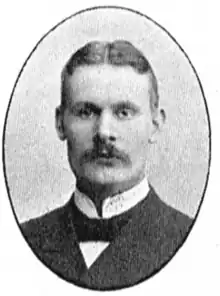Torsten Thunberg
Torsten Ludvig Thunberg (30 June 1873 – 4 December 1952) was a Swedish physiologist and biochemist who worked on metabolic oxidation, including examinations of key steps in the tricarboxylic acid cycle, producing insights that were later elucidated by Hans A. Krebs. He was a professor of physiology at the University of Lund. The Thunberg grill illusion, also called the thermal grill illusion was discovered by him. The so-called Thunberg tube for examining biological redox reactions[1] was also named after him.

Life and work
Thunberg was born in Torsaker, Sweden to businessman Per Erik Thunberg and Wendela Maria Elisabeth Hård. He studied medicine at the University of Uppsala and received an MD with a thesis on epidermal sensory organs and perception. He worked at the Institute of Physiological Chemistry in 1893-94 under Olof Hammarsten and the next two years at the Institute of Physiology at Uppsala under Frithiof Homgren. His 1896 work noted what is now called the "thermal grill illusion", a perception of extreme heat and pain from placing closely interlaced warm (40 °C) and cold (20 °C) stimuli on the skin.[2][3] He also noted that pinpricks produced two impulses of pain with differences in timing which were later shown to be due to different nerve fibre groups. He moved to the University of Lund in 1904, shortly after the death of Magnus Blix. Thunberg contributed to Willibald Nagel's Handbuch Der Physiologie Des Menschen. Thunberg examined oxidative metabolism and began experiments with Heinrich Wieland. He developed a micro-respirometer to measure oxygen use and carbon dioxide production by tissues.[4] In 1912 he examined dehyrogenase enzyme activity using methylene blue indicators and noted the role of succinate in a chain of compounds.[5] The use of methylene blue indicator led to rapid advances in metabolic studies. In 1924 Thunberg designed a casing with air pressure pumps to assist polio victims breathe. His "barospirator" was modified by others and was used as prior art by John H. Emerson to invalidate the patent of Philip Drinker for an iron lung.[6][5][7][8]
Thunberg was also involved in social activism in his student years at Uppsala, taking part in the Verdandi, along with Hjalmar Öhrvall. The Temperance Order Verdandi (Nykterhetsorden Verdandi) founded in 1896 were involved in socialist goals and supported temperance measures.[9][10] He was elected to the Royal Swedish Academy of Sciences in 1928. He died following a fracture of his thigh in 1952.[7]
References
- Vishniac, Wolf (1957), "[15] Methods for study of the Hill reaction", Methods in Enzymology Volume 4, Methods in Enzymology, vol. 4, Elsevier, pp. 342–355, doi:10.1016/0076-6879(57)04063-x, ISBN 978-0-12-181804-3, retrieved 2022-01-25
- Bach, Patrick; Becker, Susanne; Kleinböhl, Dieter; Hölzl, Rupert (2011). "The thermal grill illusion and what is painful about it". Neuroscience Letters. 505 (1): 31–35. doi:10.1016/j.neulet.2011.09.061. PMID 21985772. S2CID 41155211.
- Defrin, Ruth; Benstein-Sheraizin, Anat; Bezalel, Adva; Mantzur, Ofira; Arendt-Nielsen, Lars (2008-09-15). "The spatial characteristics of the painful thermal grill illusion ☆". Pain. 138 (3): 577–586. doi:10.1016/j.pain.2008.02.012. ISSN 0304-3959. PMID 18374485. S2CID 20979393.
- Thunberg, Torsten (1905). "Bin Mikrorespirometer 1: Ein neuer Respirationsapparat, um den respiratorischen Gasaustausch kleinerer Organe und Organismen zu bestimmen". Skandinavisches Archiv für Physiologie. 17 (1): 74–85. doi:10.1111/j.1748-1716.1905.tb00545.x.
- Thunberg, T. (1930). "The Hydrogen-Activating Enzymes of the Cells". The Quarterly Review of Biology. 5 (3): 318–347. doi:10.1086/394361. ISSN 0033-5770. S2CID 85232694.
- Haddad, Christine S.; Wang, Jingping; Alston, Theodore A. (2019). "Thunberg's Barospirator, a Fully Encasing Predecessor of the Iron Lung". Journal of Anesthesia History. 5 (4): 147–148. doi:10.1016/j.janh.2019.08.001. PMID 31735280. S2CID 202811286.
- Kahlson, G. (1953). "Torsten Thunberg, 1873-1952". Acta Physiologica Scandinavica Supplementum. 111: 3–24. PMID 13147946.
- Thunberg, Torsten (1953). "Occurrence and Significance of Citric Acid in the Animal Organism". Physiological Reviews. 33 (1): 1–12. doi:10.1152/physrev.1953.33.1.1. ISSN 0031-9333. PMID 13013830.
- Lindberg, Bo S. (2015). "Physiology of the senses—a prominent area of science in Uppsala at the end of the nineteenth century". Upsala Journal of Medical Sciences. 120 (2): 78–89. doi:10.3109/03009734.2015.1029653. ISSN 0300-9734. PMC 4463480. PMID 25891788.
- Hurd, Madeleine (1994). "Liberals, Socialists, and Sobriety: The Rhetoric of Citizenship in Turn-of-the-Century Sweden". International Labor and Working-Class History. 45: 44–62. doi:10.1017/S014754790001245X. ISSN 0147-5479. S2CID 145559225.